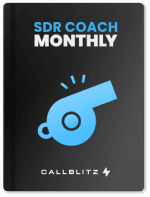How to Get Rid of Commission Breath on Your Sales Team

Jack Knight
May 8, 2024
TL;DR:
SDRs who are too focused on hitting their monthly and quarterly targets can come off as too pushy, desperate, and insecure, which can lead to burned bridges with potential customers.
Instead of just trying to close deals, sales reps should focus on getting to know their prospects and understanding their needs. This way, they can build trust with prospects, instead of coming off as just another salesperson.
Sales managers should give their reps the tools and training to shift their mindset from aggressive selling to relationship-building. Being a hands-on manager and helping your team to detach from the outcome are great ways to reduce commission breath.
Building a cold-calling culture where failure is an expected part of the learning process can help SDRs have less stress and anxiety around performing. Managers should make sure that all reps enter calls without expectations, focusing only on their output.
Commission breath is probably the most prevalent issue that holds SDRs back from reaching success. When you work in sales, you need to reach your monthly or quarterly quota. It’s very black and white, you either succeed or you don’t. It is how we get paid and how we get promoted, so it's only natural that sales reps focus on that.
But, many SDRs make the mistake of only focusing on the outcome of their sales. They let their whole worth, value, and success ride on the number of meetings they book and they completely forget about their input, how they sound on the phone, and that they are talking to another human being.
The stress, pressure, anxiety, and insecurities reps have around hitting targets translate through the phone. The prospect can feel your “commission breath” when you are desperate to book a meeting, and it’ll only push them away.
People don’t appreciate getting pressured into buying something or booking a meeting by a sales representative, and commission breath can make them resistant from the get-go. All SDRs should try to identify whether they have it, and if so, they should do everything possible to eliminate it when calling leads.
But, most importantly, sales managers should try to lessen the chances of their reps having commission breath by coaching them properly and by harboring a healthy culture that is not outcome-oriented.
Why Commission Breath is Bad
To understand why salespeople have a bad reputation, we should look into the history of commission-based sales. The only pay salespeople would get was the commission from the sales they made. This meant that if they didn’t make a sale, they wouldn’t get paid. Commission-based sales became more prevalent in the late 19th century and the early 20th century.
Having the pressure to make sales in order to make a living, sales representatives felt the need to resort to unethical sales tactics, such as misrepresenting the products or services they were selling, using high-pressure tactics to get consumers to buy, and adding hidden charges to a purchase.
All of these actions led to the lack of trust consumers have towards salespeople. The general consensus is that sales representatives will try to sell you anything, whether it will benefit you or not, just to get money out of it. This, naturally, has made consumers more defensive and more resistant to cold calls.
Being too pushy on the phone, not taking “no” for an answer, not listening to the prospect’s needs, and clearly reading from a script, are all actions that make the commission breath reek through the phone. This type of behavior will only make the prospect feel uncomfortable, and it’ll make it clear that the rep is desperate to make a sale.
Another problem with commission breath is that it shows the leads that you need them. This can make prospects feel more pressured and therefore resistant. When SDRs take a more relaxed and consultative approach to sales calls, prospects feel more in control of the conversation, which can make them more open to participating in it.
SDRs that only focus on the outcome of their sales tend to burn through lists of leads, losing many possible meetings just because of their tone.

How to Combat Commission Breath
How to Identify it
Ask yourself questions like what is your primary goal when calling a prospect? Is it to book a meeting, or is it to understand how you can bring value and solutions to their specific needs? Are you trying to pitch straightaway in a call, or are you trying to listen to them first? Are you going into too much detail when pitching? Are you overexplaining the features? And, how do you handle objections?
Another way we might come across as too desperate is if we end every sentence in an up tone. That can make us sound very unsure when saying things and it makes us seem insecure. In general, we need to be careful with our tone when making calls, as it is the only way we can pass our energy through to the prospect.
If you’re unsure whether you have commission breath or not, you should have other people from your team hold you accountable. Make call blocks together where others can hear you and give you feedback and have your manager join your calls so they can coach you and tell you what you can work on.

Practical Steps to Take
To come across as more relaxed, confident, and likable, you should shift your focus completely. Instead of focusing on booking a meeting, focus on your input. As said in Matthew 7:15-20, every good tree bears good fruit, but a bad tree bears bad fruit. In the same way in sales, good input will bring good results.
Actively listen to your prospects and understand their current pain points, research their needs before calling them so you can be more informed, put yourself in their shoes, and truly try to see if you can bring any value to them or any solutions to their problems. Also, end your sentences with down tones instead of question marks. Be confident.
Another important step to take to avoid commission breath is building rapport. When building rapport with your customer over the phone, focus on matching your prospect’s tone and energy levels, show an interest in them, engage in small talk, and try to find common interests or experiences to make them feel more comfortable and at ease. Imagine talking to a friend. But, be careful not to force anything and to keep everything natural.

Value Selling
Value-based selling is all about taking a more consultative approach on the phone, where reps ask more questions and try to learn more about the prospects, rather than just talking about their product. Value selling can help reps build trust and long-term relationships with possible customers, which will also help catch their attention.
And the truth is, if you are not bringing any value to the lead, they won’t be interested in booking a meeting with you. No one will take time from their busy day to meet with someone who can’t help them in any way. That is why bringing clear value is super important to be able to book meetings.
However, overselling and over-explaining products can come off as too pushy and desperate. Your job is to sell the meeting, and then it is the account executive’s job to go into detail with all the features and details the product has. As long as you truly believe that what you’re selling can bring value to the lead, you’ll sound more confident and sincere on the phone.
How to Remove Commission Breath as a Sales Manager
When reps have commission breath, it ultimately stems from the stress and pressure of reaching quota. If your reps feel more relaxed and not as pressured, it’ll be easier for them to focus on their input rather than their output. As a manager, you can have control over what your reps are prioritizing.
When I coach my reps, I try to teach them to have a completely different mindset, I help them make a practical plan to keep up with targets, and I try to get them to zoom out to see the bigger picture and detach from the outcome.
1. Mindset: When I'm with my team, I try to tell them to have an abundance mindset, instead of a scarcity mindset. Rather than feeling that every “no” is a failure, I encourage them to feel that every “no” is a step closer to a “yes”. If someone is not interested, we just call the next person.
I tell my team that they are learning, growing, and trying, and that is a win right there. It doesn’t matter how many times they get knocked down, but how many times they get back up.
It’s like going to the gym and trying to hit a personal record when doing squats. It will be painful, it will be uncomfortable, and you might not succeed. But you still went there and tried, so next time you’ll be stronger and better.

2. Practical help: It’s very important that reps understand how many calls they need to make on average before they get a meeting. If my reps are struggling to meet quota, I try to help them to make a practical plan. I ask them, how much time is there left? How many meetings do you need? Then, based on that and the average amount of calls they need to make to book a meeting, we create a plan.
Also, reps can often get tunnel vision when it comes to a list of leads. I try to help them find other campaigns and sources of leads to give them bigger chances of booking meetings.
3. Detach from the outcome: In the middle of the pressure, reps can get caught up in the stress and anxiety. That is when I try to pull them back a bit and help them see things from my perspective. We look at the facts and the data, and we go from there.
Although emotions can be good because they tell us what’s wrong and what we need to focus on, they can also bring us way too deep into a situation that they blind us. That is why I encourage my reps to detach from the emotions of anxiety and stress and focus on the bigger picture.
Whether they reach their targets or not, that doesn’t make them good or bad people. I tell them to stop thinking that their worth and value ride on the outcome. If what we’re doing now is not working, we re-evaluate our plan and that is completely OK.
Onboarding New SDRs
When you bring on new SDRs, it is super important to set the right culture to avoid them having commission breath.
I tell my new hires that the only way you can fail in this role is if you don’t ask a million questions and if you don’t make multiple mistakes. You need to fail to learn, and I expect you to fail. This takes the pressure off of them, and they won’t be thinking “I should be booking more meetings by now”, or “I should be doing better”.

Instead, they ask themselves “Am I growing?”, “Am I learning from this?”, “Am I putting myself out there?”, “Jack said it’s OK I’m failing because that’s how I will learn”. With that mindset, they will eventually start being successful.
Another thing I try to teach to my new reps is that the key to cold calling is not caring. When you start your first SDR role, you have this nervous energy which is normal. Sales is something completely new to you and you probably haven’t fully understood what you are selling and what value it is bringing to your lead.
So you end up saying very few things on the phone because you don't know what you are talking about yet, and you don't know how to react to different objections.
Once you start becoming more familiar with the product you’re selling, but you still care too much about making a sale, you start over-explaining the features of the product and you might go into too much detail. This will, again, seem too eager to the prospect.
Experienced salespeople mention the same amount of information as a new SDR would, but their objection handling is way stronger because they have so much more knowledge about the product and the industry, and they are completely detached from the outcome, not having any expectations.
This approach seems way more genuine to the prospect, and it doesn't come across as too pushy, insecure, and desperate.

The Right Actions Can Eliminate that Commission Breath
Commission breath will hurt your team’s performance. Salespeople already have a very bad reputation and coming across as very pushy, anxious, and insecure over the phone will just trigger negative emotions in prospects.
The pressure of reaching monthly and quarterly targets can cause SDRs to have immense stress and anxiety, and they can easily lose their focus when making cold calls. This will quickly become apparent to the prospects on the other side of the call.
All SDRs should evaluate themselves to identify if they are only focusing on the outcome of their sales. Shifting our focus from the outcome to the input can have huge effects on our success in sales, and managers should make sure to create a cold-calling culture where failure is a part of learning and developing.
Ready to make your reps fall in love with the phone?
Build a real cold-calling culture on the CallBlitz salesfloor
More Here
Jack Knight
Jul 22, 2024
Why SDRs and AEs Should Dial Together
Jack Knight
Aug 22, 2024
How to Track Your Remote Sales Strategy
Jack Knight
May 8, 2024



